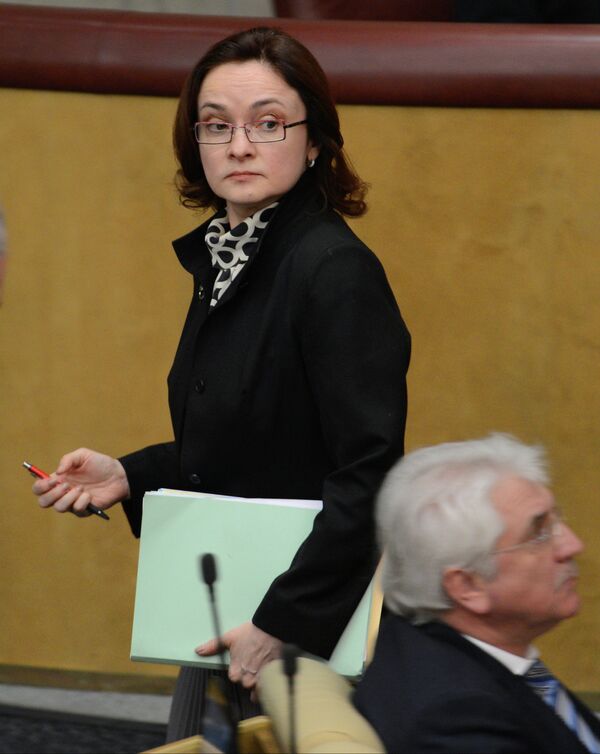MOSCOW, April 9 (RIA Novosti) – Russia’s parliament approved President Vladimir Putin’s nominee, former Economics Minister Elvira Nabiullina, as the new head of Russia’s central bank on Tuesday.
The State Duma, the lower house of Russia’s parliament, voted by an overwhelming majority of 360 for and just 20 against her candidacy, with one abstention.
Nabiullina, who served as Russia’s economics minister from 2007 to 2012, will take up her four-year tenure as the country’s central banker from June 24. She will be the first female top banker in the G8 group of seven industrialized nations plus Russia.
The Central Bank’s current chief, Sergei Ignatyev, has served three consecutive terms and will step down on June 23.
In a speech to parliamentarians before her endorsement, Nabiullina pledged to ensure the continuity and predictability of the Central Bank’s policy, but said some changes would also follow.
She cited long-term global uncertainty, a rethink of Russia’s growth model with a new emphasis on internal sources of development, diversifying the country’s raw material-based economy, increasing investment and developing small and medium business as the main challenges facing the Central Bank and the domestic economy.
“Otherwise, 2-3 percent [economic] growth will become our new norm instead of 6-7 percent before the crisis,” Nabiullina said.
Russia’s Economic Development Ministry has forecast 3.6 percent economic growth in 2013 but may revise that figure downward owing to the country’s sluggish development in the first few months of 2013.
Former Finance Minister Alexei Kudrin said on Tuesday Russia’s economic growth in 2013 would remain feeble and Russia would have to fight even for 3 percent growth.
Nabiullina said the central bank’s policy should contribute to growth by expanding refinancing instruments to banks to ease lending to the real sector of the economy, and by gradually cutting annual inflation to 3-4 percent from the current level of over 6 percent.
“The problem of loan accessibility needs to be addressed. It is conditioned by many factors. But I am far from thinking we’d achieve economic growth through the administrative lowering of interest rates on loans,” Nabiullina said.
Excessive loan availability carries the risk of creating bubbles on the domestic loan market, prompting Russia’s central bank to seek a balance between ensuring macroeconomic stability and spurring economic growth, she said.
Specific decisions on interest rates should be made on the basis of such factors as inflation dynamics, unemployment, economic growth and the government’s tariff policy, Nabiullina said.


